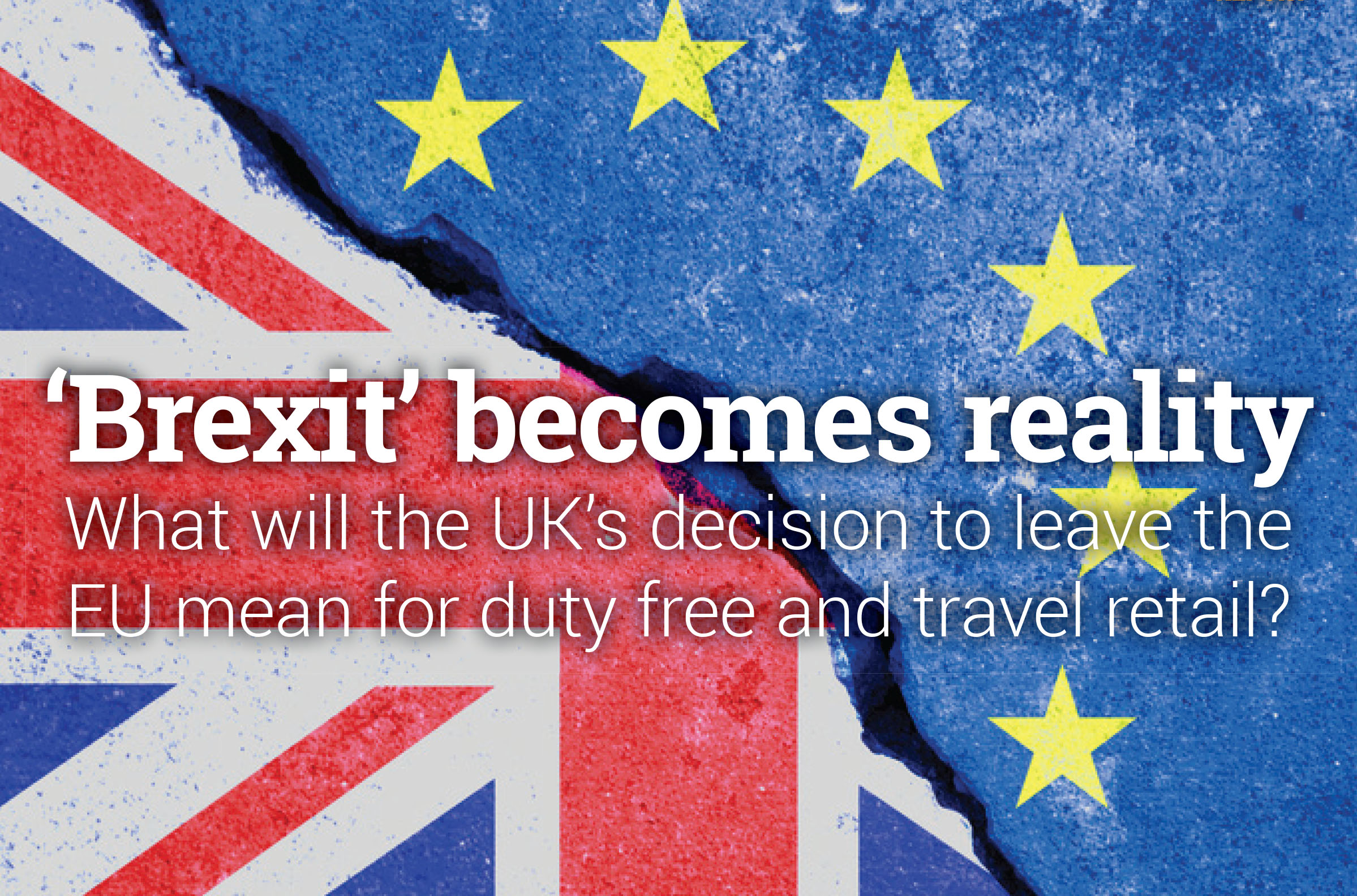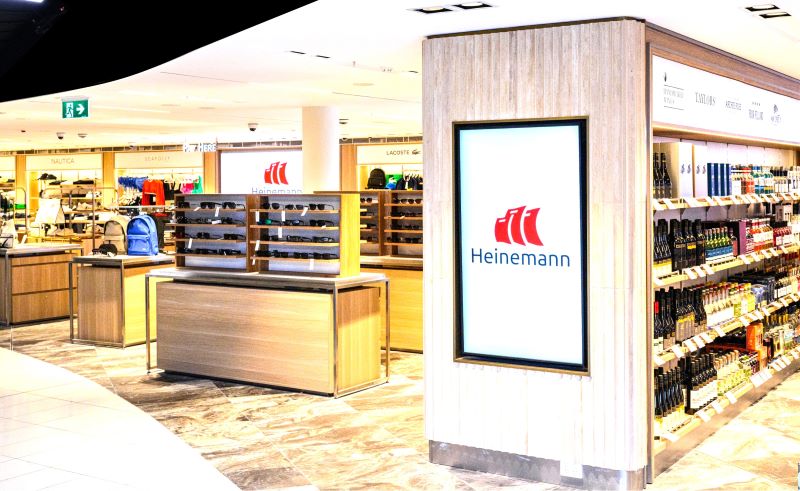 PUBLISHER’S INTRODUCTION: The individuals were a little older, a degree wiser, and certainly a lot more experienced. But their commitment to and enthusiasm for a cause has never burned brighter.
PUBLISHER’S INTRODUCTION: The individuals were a little older, a degree wiser, and certainly a lot more experienced. But their commitment to and enthusiasm for a cause has never burned brighter.
At an informal briefing last week at the Gatwick Hilton Hotel in the UK, some veteran figures from key travel retail industry associations and lobbying groups met industry business media to talk about the campaign to restore duty free shopping between the UK and European Union countries in the wake of the former’s Brexit vote on 23 June.
Several of the industry representatives present (European Travel Retail Confederation President and Secretary General, respectively, Sarah Branquinho and Keith Spinks; Duty Free World Council President Frank O’Connell; Tax Free World Association President Erik Juul-Mortensen; and Hume Brophy Founding Partner John Hume) are hardened campaigners of the mid- to late-90s effort to save intra-European Union duty free, a fight that was lost, seemingly forever on 30 June 1999 when the channel was formally abolished.
The prospect of any sort of intra-EU duty free returning, ever, was little more than a pipedream. But all that changed in the turbulent days of late June 2016, just short of the 17th anniversary of abolition. What if a EU country was to remove itself from the Union?

That, of course, is what happened with the Brexit vote, when the people of the UK voted to leave the EU more than 43 years after the nation had joined what was then the European Economic Community on 1 January 1973.
It was an astounding, tumultuous and wholly unexpected decision with huge repercussions across economies, business, politics and communities. And there, slap bang in the middle of this upheaval is the duty free sector, potentially given the unlikeliest of lifelines.
Why the ‘potentially’ qualifier? Surely once the UK is no longer part of the EU, then its travel retailers can automatically sell duty free items to EU-bound travellers and vice-versa?
That is certainly the dual target but before it happens much political and legislative process – and some key UK law changes – have to happen. At last week’s media briefing from industry representatives (who also included ETRC and UK Travel Retail Forum board member and Glasgow Airport Commercial Director Francois Bourienne), the road map forward was revealed. It is a road full of challenges but one which leads to a profoundly important prize.
Don’t expect a headline-grabbing, loudspeaker-blaring public campaign. This is going to be very much a behind-the-scenes push, at least in the early days, as the pro-duty free lobby strives to ensure its cause is not buried, blurred or rebuffed during the hugely complex process of Britain’s extrication from the EU.
Importantly, industry campaigners note that they are not pro-Brexit, but as the UK has decided to leave, then it is the UK Travel Retail Forum and ETRC’s responsibility to ensure that the UK and EU governments are fully aware of this potential benefit for travellers and transport operators.
It’s important also to note also that the effort to restore duty free between the UK and the remaining EU countries is actually being waged on two fronts, albeit they are intrinsically linked.

What happens and when?
- UK Prime Minister Theresa May is likely to trigger Article 50 – the mechanism for leaving the EU – on 9 March or soon afterwards.
- That action will lead quickly to the start of formal negotiations between the UK and the EU on the terms of Brexit.
- The UK has two years to complete what amounts to a complex divorce, including allowing time (probably around six months) for the deal to be approved by various EU member countries’ parliaments and the European Parliament itself. Many important issues will have to be resolved, including, most notably, the cost to the UK of the exit (estimated in some quarters at €60-80 billion), as well as issues pertaining to UK and EU residency and employment rights, healthcare and division of assets.
Where does duty free fit in?
In simplistic terms, duty free sales in EU countries to travellers bound for the UK should return the very day that the Treaty of Lisbon no longer applies in the UK – and by dint of that fact the country is not a EU member. As we have reported, this should apply whether or not there is a ‘hard’ or ‘soft’ Brexit and whether or not the UK remains part of a Single Market or Customs Union.
The ETRC position mirrors that notion. The Confederation is calling for a return to duty free the day that Britain leaves the EU. That position applies equally to EU retailers serving UK-bound travellers and vice-versa.
Sounds simple? It isn’t. Here The Moodie Davitt Report sums up how the travel retail interest groups are addressing some of the key issues, challenges and opportunities.
It’s a much more positive, populist campaign than the 1999 counterpart, based on an entirely logical return for a business that recognises that the UK is – just like, say, China, the US or Russia – no longer part of the EU.
Q. What are the differences involved in ensuring a return to duty free in the UK (for EU-bound travellers) versus the other way around?
A. In theory there are no legislative changes required from the European side for a full return to duty free. UK legislation, however, needs some changes in order for duty free to be restored.
Q. How many changes?
A. There are three specific pieces of legislation that require amendments – mainly definition-related. These relate to the Value Added Tax Act, the Excise Goods (Aircraft and Ships’ Stores) Regulations 2015 and the Excise Goods (Export Shops) Regulations. The ETRC hopes that the UK government can be convinced to make the requisite changes.
Q. Sounds complex.
A. Not at all. The changes needed are actually minor. But they must happen. So the duty free lobby needs to build up political support, quickly, to ensure that’s the case.
Q. Is that straightforward?
A. No, it requires a great deal of communication and lobbying behind the scenes. The danger is that the duty free question is caught up in a messy interim agreement between the UK and the EU. The UK government is currently preparing ‘The Great Repeal Bill’, a landmark proposal that will end the EU’s legal superiority in the UK by absorbing EU requirements into British law when Brexit happens. It will also allow the British Parliament power to scrap elements of EU legislation that it does not wish to retain.
Q. A momentous project then?
A. It sure is. It contains some 50,000 pieces of legislation, and will take up a huge amount of parliamentary time over the next 12-14 months.


Q. Sounds like duty free could be caught up in heavy traffic?
A. Yep. If we’re not careful it will be like riding a Moped around Piccadilly Circus during rush hour.
Q. How do you prevent that?
A. We have to ensure that the British government – and the various European member states – see the return of duty free as a positive development emanating from Brexit that will benefit not only the consumer but also key sectors such as maritime and aviation industries as well as employment nationally and regionally. With many open questions about market access between the UK and the EU by air or sea, and the potential impact of the new arrangements on travel, the return of duty free becomes a positive message. It’s also critical to have it understood that this is an opportunity that should be seized immediately, not somewhere down the line.
Q. Any likely barriers?
A. There are always pushbacks in any kind of lobbying campaign. The industry must ensure the known positives very much outweigh any perceived or alleged negatives.
Q. Could you end up with the ultimate anomaly, at least initially, of EU countries being able to sell duty free to UK travellers but not the reverse?
A. Yes. Hence the need for hard work behind the scenes to ensure the necessary UK legislation is passed and that duty free is fully restored between the UK and the EU.

 OTHER KEY POINTS
OTHER KEY POINTS
- The ETRC and UK Travel Retail Forum aim to keep the debate uncomplicated by simply demanding a straight return to duty free. It is not calling for any changes to duty free allowances, nor asking for arrivals duty free shops to be established.
- The ETRC and UK Travel Retail Forum are working in tandem, both striving for a similar result. Several European markets, notably Ireland, Spain, Portugal, France, Germany and others enjoy very high passenger flows into the UK and stand to benefit hugely from a return to the old duty free system.
- There are real benefits to many sectors of industry and many regions of the UK and Continental Europe. Education and communication of those benefits is vital.
Many companies are great supporters but there is a tremendously valuable prize in sight here that all industry stakeholders stand to benefit from. It is wrong that only some of the beneficiaries are funding the fight to deliver it.
Q. Does the lobby require greater support from those involved in the duty free industry?
A. Yes. Many companies are great supporters but there is a tremendously valuable prize in sight here that all industry stakeholders stand to benefit from. It is wrong that only some of the beneficiaries are funding the fight to deliver it. The lobby needs professional resources (such as Hume Brophy). They don’t come cheap. It would be a catastrophe if the campaign falls short for lack of resources.
Q. Who really benefits from a return to duty free? How do you prevent it being seen as only benefiting vested commercial interests, particularly the liquor & tobacco sectors only? Why should other product suppliers care?
A. As mentioned, duty free is a considerable consumer perk that got partially taken away in 1999. So the consumer wins, as does industry. Commercial revenues are a key subsidiser of aviation and maritime infrastructure and the beneficial impact on employment in regions such as the UK, Irish and French ports, for example, has been well-documented (and will be again). Nor will just the dutiable categories of liquor & tobacco benefit – the ‘halo’ effect on other product sectors such as beauty products and confectionery is well-proven and likely to prove highly beneficial to all suppliers.
CONCLUSION
This is a very different fight than the preserve duty free campaign of the 1990s. Whereas that was a battle to stave off the abolition of a business deemed by many (ultimately too many) as anomalous to a single economic community, this is an effort to restore a rightful benefit to travellers bound to or from the UK. On both a ‘common man’ and industry level, it is a ray of sunshine at a time when the horizon is otherwise murky and both sea and air travel between the UK and EU could be negatively affected by Brexit.
In that sense it’s a much more positive, populist campaign than the 1999 counterpart, based on an entirely logical return for a business that recognises that the UK is – just like, say, China, the US or Russia – no longer part of the EU.
But its logicality does not make the argument simple nor easily won. There are many hard yards to put in before the industry can toast the return of UK-EU duty free.












